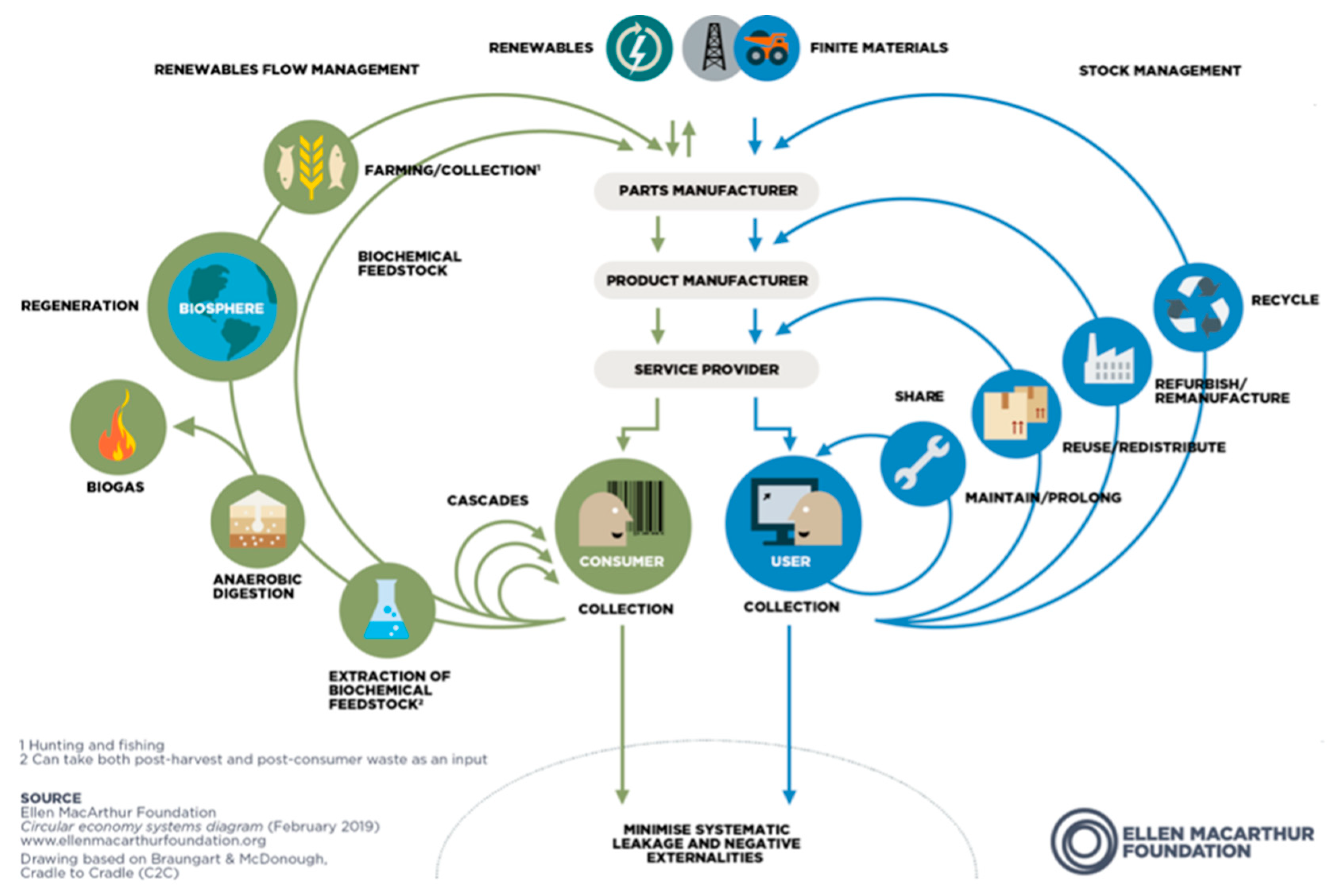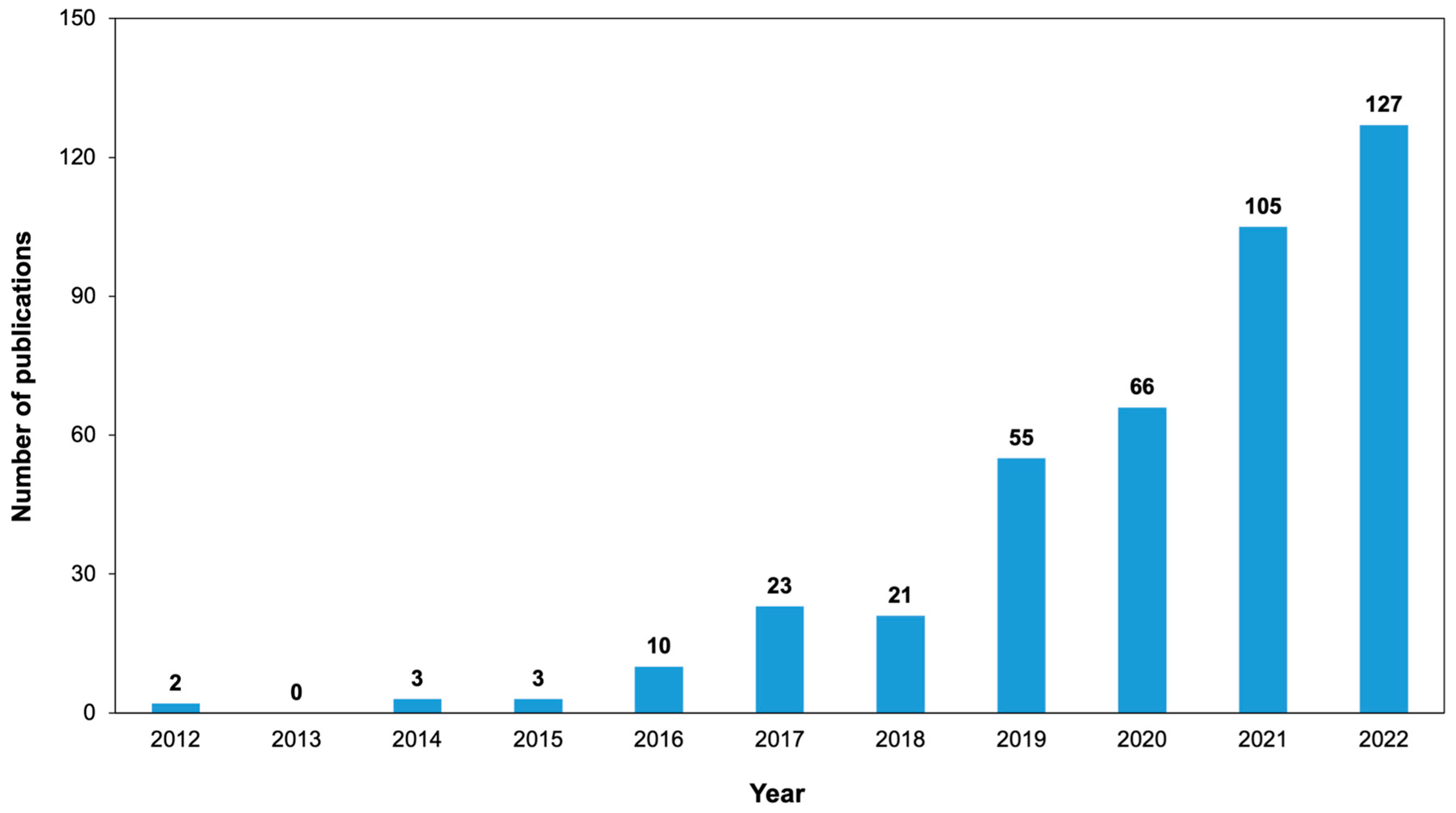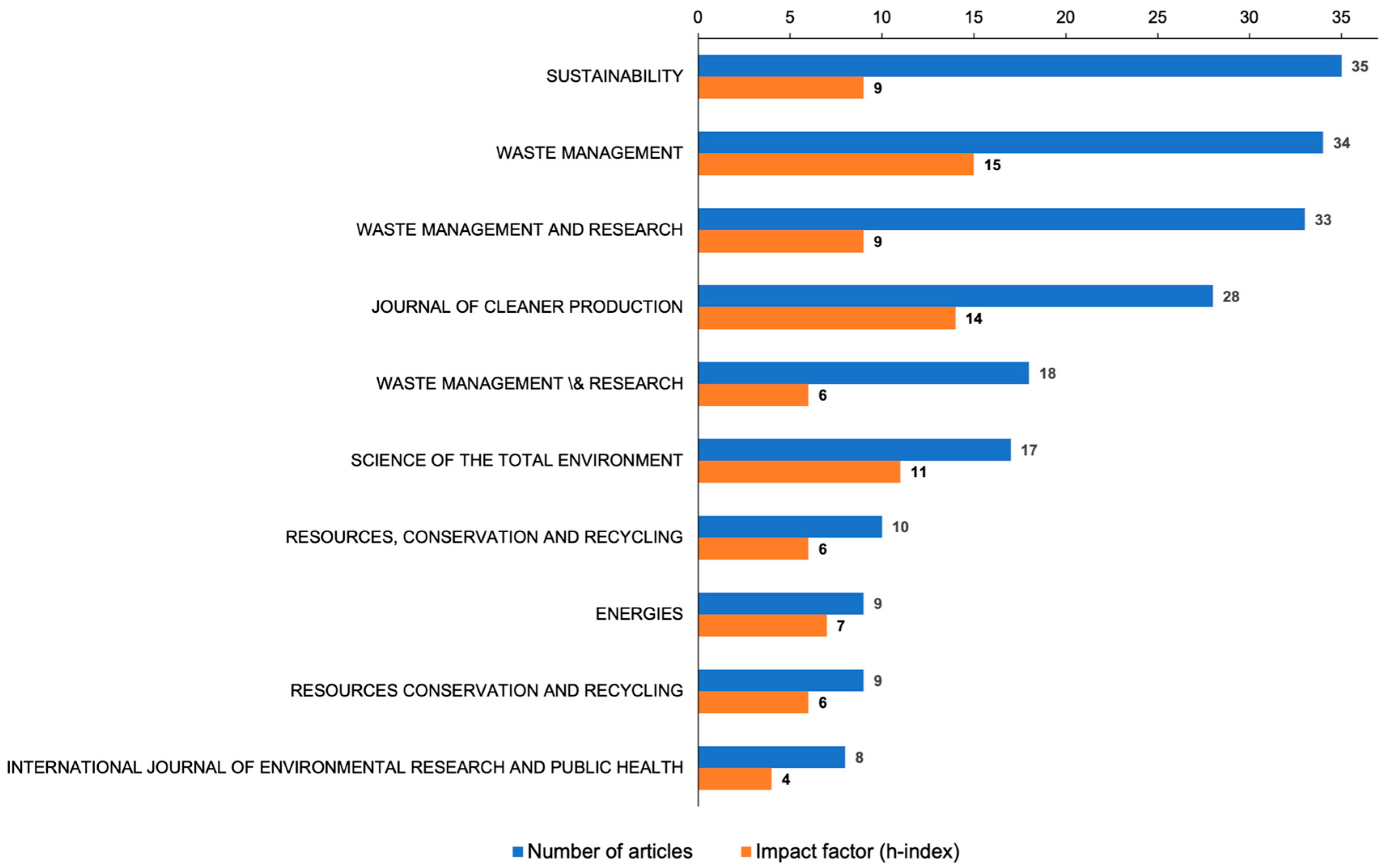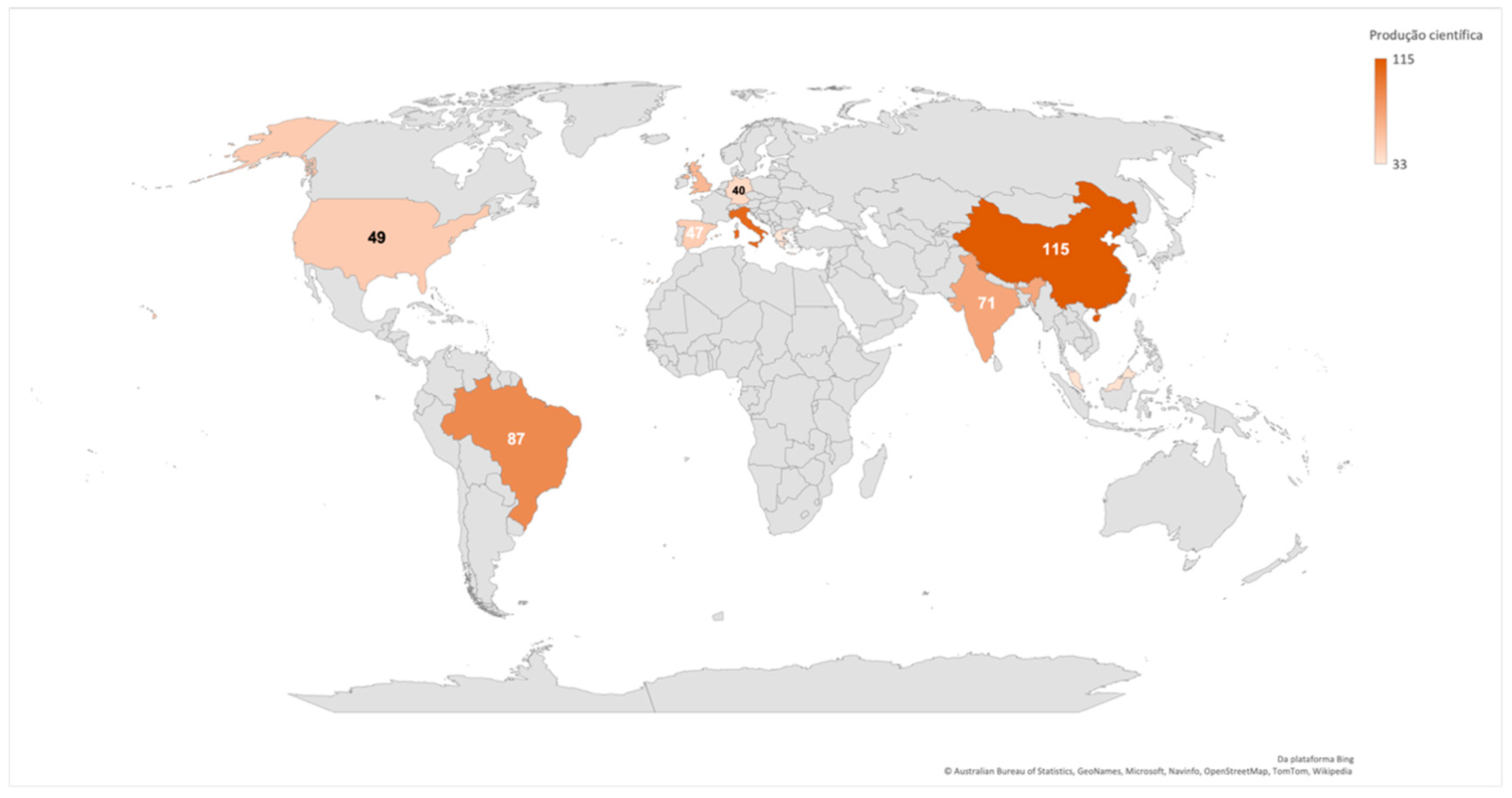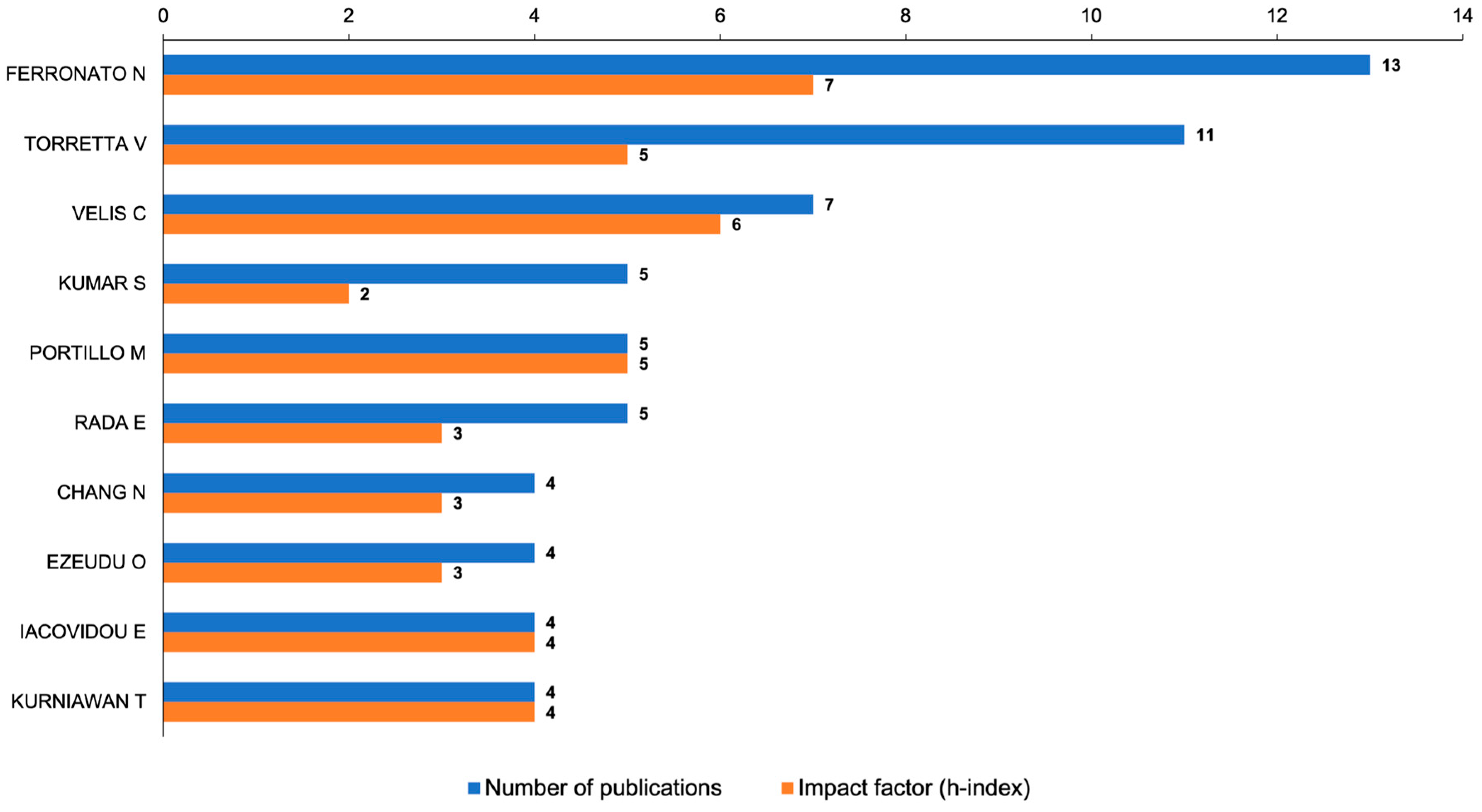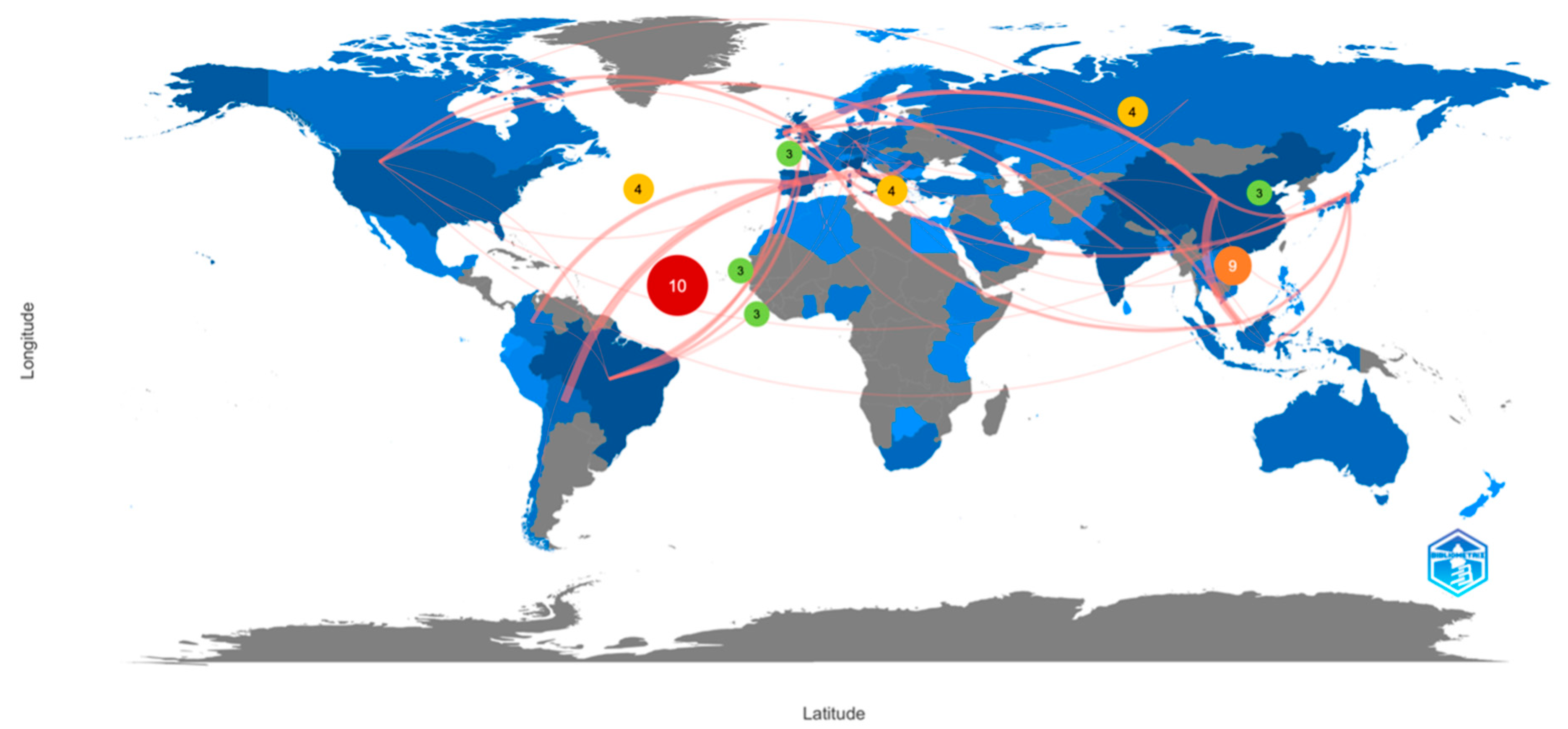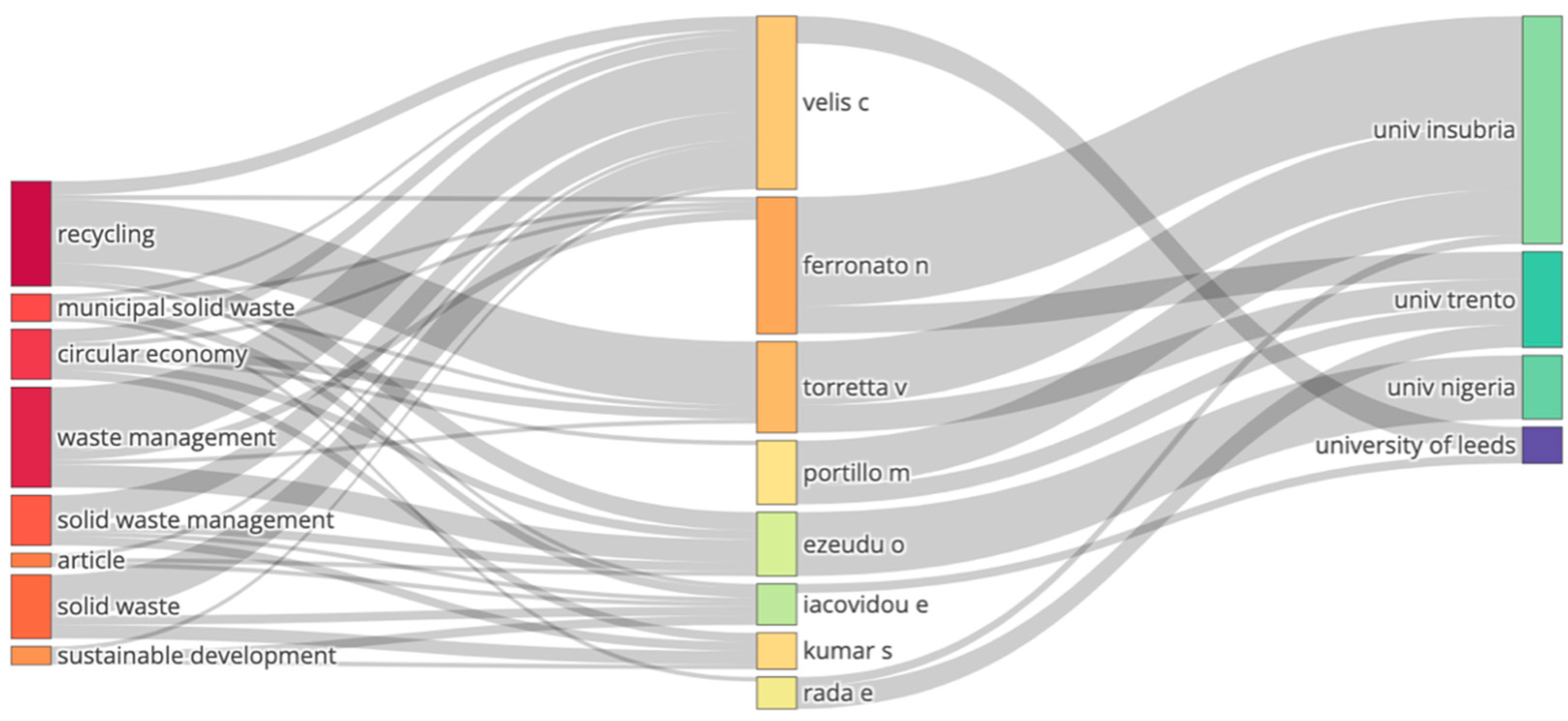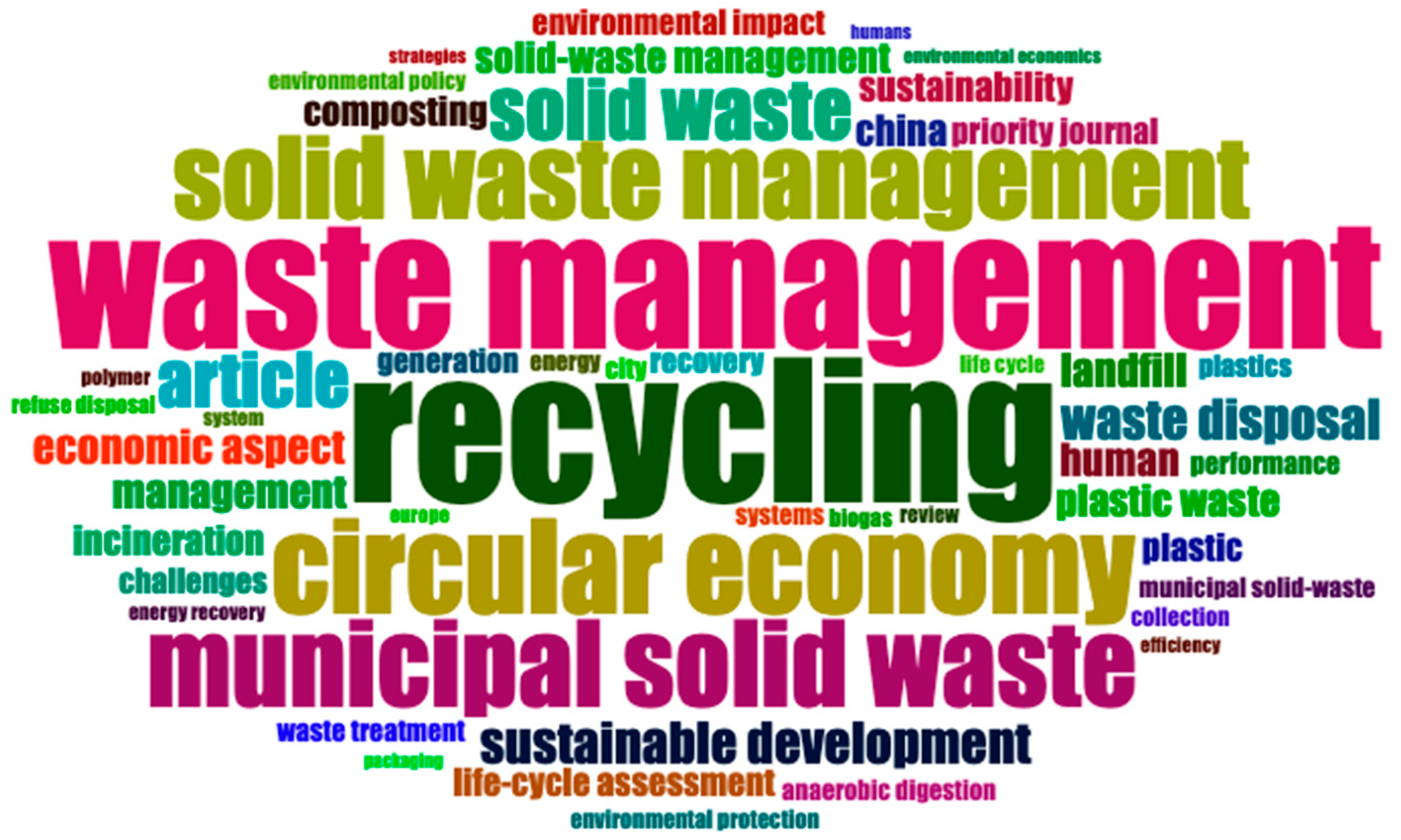1. Introduction
Among the many problems facing humanity today are those related to solid waste (SW). Many of them are related to the waste promoted by modern society as a result of the linear economic model [
1], which is considered the main cause of the depletion of natural resources [
2].
Population growth [
3], urban growth, and consumption [
4] are factors that burden the economy with disproportionately large waste streams, creating waste management costs and limiting the capacity to properly dispose of these materials. This leads to the pollution of water bodies, the spread of diseases, the increase of greenhouse gases, the contamination of groundwater [
5], and the depletion of landfills due to the high per capita production of waste [
6].
The need to ensure sustainable production and consumption patterns has been recognized in the United Nations Sustainable Development Goals (SDGs), specifically in Goal 12.5, which aims to "significantly reduce waste generation through conservation, reduction, recycling, and reuse by 2030" [
7].
This intention is in line with the proposal of CE, a concept that has great potential for more sustainable development by seeking solutions to the problems of production, consumption, and waste [
8].
Proper solid waste management is an important step in the transition to CE, as it helps to maximize the recovery and reuse of materials, which reduces the pressure on new natural resources [
9].
However, despite this positive relationship, the literature points to gaps in knowledge about how current management systems can be transformed into circular models, incorporating CE strategies in different sectors. Studies show that more research efforts are needed in this direction. In addition, there is a need to find the missing link between the shortcomings of industrial sectors and the collaboration of others to make CE viable [
10] and also a lack of research into the role of governments in implementing CE [
8].
Although research on CE has made its most significant contributions only in the last decade, several reviews can be found in the scientific literature. The current state of research on CE shows that although the concept is widely researched and several case studies analyze its application in different contexts, there are few tools and criteria to measure the degree of circularity of products, companies, or regions [
11].
The aim of this study is therefore to carry out a meta-analysis of research published between 2012 and 2022 on solid waste management and the circular economy using bibliometrics. The aim is to answer the following questions: What is the profile and evolution of scientific research on CE and SWM over the last ten years? What are the most relevant perceptions of CE and GRS?
This article is organized into four sections, including this introduction, which outlines the problem and the objective of the study. The theoretical basis then covers the concepts of the linear and circular economy and solid waste management, highlighting some of the problems and challenges related to them. The third section is the methodology, which details the steps followed by the researcher to show the criteria for choosing the databases and selecting the articles used in the analysis.
The fourth and final section presents the results in the form of graphs, maps, tables, and diagrams. Then, still in this stage, there is a discussion of the works to highlight the potential of GRS for the development of CE based on the perception of the authors who have published the most on the topics, as well as establishing their connections. Finally, the paper makes suggestions for future research and its limitations.
2. Theoretical basis
The current global economic system, inherited from the Industrial Revolution of the 19th century [
12], considers the planet's resources to be infinite and the Earth to have a high regenerative capacity. This linear model is summed up in the pillars "take, make, dispose of", i.e., capture the resources needed to meet human needs, produce goods that can be sold for increasing profits, and dispose of what is no longer needed [
1].
Some of the consequences of this system are higher GHG emissions, increased waste generation [
13], a reduction in the useful life of landfills, and permanent environmental damage [
14]. These are constant challenges for public managers and decision-makers, as well as going against the grain of sustainable development.
In general, waste becomes a problem as soon as it is generated and not treated properly. Poor management also negatively affects the urban environment and human health, leading to reduced productivity and economic development [
15]. In addition, they can also contaminate soil and groundwater [
16].
Developing countries traditionally send their waste to open-air landfills, known as dumps, controlled landfills, or sanitary landfills with little or no recovery of materials that can be recycled [
17]. In developed countries, waste is burned in power plants to generate electricity [
18].
In this way, adopting modern SWM practices with efficient collection mechanisms and encouraging the work of waste picker cooperatives, setting up landfills that are built correctly from a technical point of view, and recovering waste for energy (Waste to Energy) are consolidated as relevant opportunities for improving the urban environment, as well as adding value to post-consumer materials and by-products [
19,
20].
On the other hand, GRS can be characterized as a wicked problem [
1,
22], i.e., complex and difficult to solve because it involves legal, environmental, social, economic, cultural, institutional, and technical aspects. It requires equally complex means of management that are based on a paradigm shift.
This is the case, for example, when incineration is carried out to reduce the volume of waste and generate electricity. This practice can pose obstacles to public health and contribute to global warming when not carried out correctly or within acceptable parameters [
23].
To reduce the challenges posed by the linear economy or the GRS, there was a need to transition to another model: the circular model [
24].
In a CE, the value of products and goods is maintained for as long as possible. Waste and resource use are minimized and, when a product reaches its end of life, it is used again to create more value. This can bring many economic benefits, which contribute to innovation, growth, and job creation [
25].
CE is a new paradigm for sustainable development and promises to overcome the contradiction between economic and environmental prosperity [
26]. This concept describes the Earth as a closed, circular system with limited assimilative capacity and shows that the economy and the environment must coexist in a state of equilibrium [
27].
In contrast to the current model of waste management, which operates from a linear perspective, i.e., taking waste to landfills or dumps [
28], CE seeks to maximize the use value of these materials by creating a closed-loop economy [
29].
CE is built on social production-consumption systems that maximize the service produced from the nature-society-nature flow of material and energy [
30]. From this perspective and in line with eco-industrial development, CE is the realization of the flow of materials in a closed cycle throughout the economic system [
31]. In this way, it is understood that in association with the principles of the 3Rs (reduce, reuse, and recycle), the central point of CE is the circular (closed) flow of materials and the use of raw materials and energy through multiple phases [
32].
From an economic point of view, CE can be based on a spiral system that minimizes matter, energy flow, and environmental deterioration without restricting economic growth or social and technical progress [
33].
The butterfly diagram (
Figure 1) inspired by McDonough and Braungart's studies on the Cradle-to-Cradle approach was created by the Ellen MacArthur Foundation and represents the technical and biological cycles of CE in a systemic way. Based on nature, the idea is to incorporate the mechanism for reusing nutrients and components into the production system so that there is no waste, forming a closed cycle for reusing materials [
34].
[
1] Wicked problems
1 arise in transformation initiatives in the presence of high complexity, deep uncertainty, profound conflicts, and divergence between stakeholders, as well as incompatibilities of scale relating to spatial, temporal, and institutional processes [
21].
The literature on CE shows that it is possible to use mechanisms to promote regenerative industrial transformations that will open up ways of achieving sustainable production and consumption [
30]. It presents a conceptual model capable of adequately guiding the use of natural resources and waste management [
36].
Some initiatives around the world have applied the principles of CE to the management of SR and have tried to point out the problems faced in its operationalization. Examples include the use of waste as industrial resources [
37], the practice of selective collection [
38] and the reuse of industrial waste [
39]. In addition, CE can also be used for the effective use of the biodegradable and non-biodegradable fraction of SR in integrated closed-loop refinery platforms for resource recovery, bioenergy and the manufacture of value-added products [
28].
Some innovative alternatives have emerged in the context of CE and GRS. One of these is integration with blockchain
2 technology. One example is the redesign of plastics by molecular tagging as a way to ensure that they are kept in an infinite cycle and support closed-loop recycling [
42].
Another path is to consider new circular business models based on 3D printing, RFID (Radio Frequency Identification) tags, Industry 4.0 and the Internet of Things (IoT) [
43].
CE has therefore emerged as a viable alternative capable of "curbing" or imposing more intelligent measures on current consumption, provided that it is implemented correctly through its guiding principles in the context of GRS.
3. Methodology
This research is exploratory and qualitative-quantitative, and the data collection procedure used was a literature review, which represents the initial step to help in the process of identifying the most relevant documents [
44].
The starting point was a bibliometric analysis of publications on the circular economy and solid waste management between 2012 and 2022. This is because during this period there was a growing increase in consumer awareness of environmental issues [
45]. In addition, there has been a prioritization of waste policies, especially in Europe, where social change is of great importance for SR [
46].
The methodological steps were as follows: a) Selection of the databases; b) Identification of the keywords that served as search arguments; c) Choice of the data processing tool; d) Definition of the parameters to be applied; e) Identification of the publications returned in the search; f) Joint analysis of the results in order to eliminate duplicates; g) Qualitative and quantitative analysis of the results.
The databases chosen were WoS and Scopus, as they bring together articles from renowned journals with a high impact factor and are widely appreciated by the entire academic community. The research was carried out between January and February 2023, and the keywords defined for the search were "CIRCULAR ECONOMY" and "SOLID WASTE MANAGEMENT".
The software used to process the data was the R language together with the Bibliometrix and Shiny packages. They represent a set of state-of-the-art tools that serve the bibliometric flow [
47]. The Bibliometrix package was installed in R Studio (the graphical interface for manipulating databases) and used a posteriori to process the imported metadata. The Shiny package consists of a user-friendly graphical interface that displays the processed information (output) in a simple and intuitive way, making it much easier for researchers to analyze it.
After consulting the Scopus and WoS databases, it was found that the exported file formats are varied, but not all of them are accepted by the data processing tools. These formats can be seen in
Table 1.
In order for the R language and the Bibliometrix and Shiny packages to process the data, BibText files with the extension. bib was selected from the databases.
The search string used in the WoS database was as follows:
In this context, the keywords "circular economy" and "solid waste management" were the search strings used and applied together using the Boolean "AND". This tells the database algorithm that both words should be searched together. The acronym TS (topic searched) stands for topic searched.
In order to filter the search by time, the time frame of interest was: 2012-01-01 to 2022-12-31". In the end, 253 articles of this classification were returned on the WoS database.
For the Scopus database, the search was carried out as follows:
The search method was the same, with a few minor variations that are specific to the platform. In this case, the search strings were entered using the "TITLE-ABS-KEY" command. Here, it was requested that the works returned be from the year 2012 onwards (in this case, as the Boolean used was only greater than ">", the algorithm did not consider the year 2011 within the time interval, i.e., the count started from 2012). Likewise, the end date considered articles published below the year 2023 exclusive. In the end, the search on Scopus returned 341 scientific articles. The two databases (Scopus and WoS) were then imported into R Studio and processed using the Bibliometrix package.
The first step was to merge the two databases and carry out a joint analysis. The aim was to exclude duplicate files and, at the end of this stage, a total of 594 scientific articles were found. After excluding the duplicates, a sample of 421 results (metadata) was obtained.
Figure 2 shows a summary of this stage.
The initial investigation was quantitative and the items analyzed were: a) the evolution in the number of publications over the years according to the time frame established (2012 to 2022); b) the most relevant journals dealing with the subject under investigation; c) the countries in which the subject is best known; d) the main authors and the impact of their production in a given area of knowledge; e) the collaboration network between countries; f) the correlation between keywords plus, authors and affiliations; and finally, g) the most relevant and recurring keywords in all the publications.
4. Results analysis
Section 4.1 uses graphs, maps, diagrams and tables to answer the first question of this study. The data is arranged according to the outputs processed by the software and analyzed in sequence.
The second question is answered in section 4.2, which presents the work of some authors who stood out during the bibliometric analysis.
4.1. Overview of publications
Figure 3 shows the quantitative evolution of scientific article publications between 2012 and 2022. It shows that the number of papers until 2018 was small, reaching zero in 2013. In 2016, the number of publications more than tripled, from 3 to 10, increasing considerably the next year when it reached 23, falling slightly in 2018. However, further growth began in 2019 and did not stabilize, reaching 105 papers in 2021 and 127 in 2022. Over the last 10 years, the annual number of publications has increased from 2 in 2012 to 127 in 2022, representing an increase of 6250%. Thus, it is possible to conclude that the "circular economy" and "solid waste management" themes are still expanding and receiving better attention from the research community around the world.
Figure 4 shows the top ten journals within the context of the sample studied, their respective numbers and impact factors. There are 201 publications, which represents 47.7% of the total. Waste Management has 34 publications and the highest h-index impact factor of 15. On the other hand, the journal Sustainability tops the list with 35 published papers, but with an h-index impact factor of 9.
Looking at the graph, it can be inferred that journals publishing articles on the circular economy and solid waste management have a bias towards sustainable issues, environmental management, and energy. This highlights the strong connection between these keywords, reinforcing the idea that solutions to the problems caused by solid waste can be found in the principles of CE.
An interesting way to visualize scientific production in CE and GRS is through maps.
Figure 5 shows the data for the ten nations that publish the most papers in this area. China and Italy account for 27.31% (115 papers) and 25.17% (106 papers) of the total, respectively. Together, this figure reaches 52.48% (221 papers). Some authors point out that Italy has a strong tradition of partnerships and collaborative work between universities, research institutes, companies, and the government. These interactions can facilitate the sharing of knowledge, resources, and funding for research projects in both CE and GRS.
In the case of China, there is intense investment in research and development, covering innovation in technologies for recycling, waste treatment and the circular economy. In addition, there is financial support from the government and partnerships with universities and companies that boost scientific research in these areas.
On the map, their territories are marked with a darker shade, indicating the highest productivity. Brazil appears in third place with 87 publications, corresponding to 20.66%.
Figure 6 shows the ten authors with the highest number of publications and their respective impact factors (h-index). In terms of productivity indices, Navarro FERRONATO and Vincenzo TORRETTA together account for around 5.7% of all publications on CE and GRS between 2012 and 2022. Costas VELIS comes third with 7 publications, followed by a tie between Sunil KUMAR, Marcelo Antonio Gorritty PORTILLO and Elena Cristina RADA with 5 papers each. The next positions are occupied by Nibin CHANG, Obiora EZEUDU, Eleni IACOVIDOU and Tonni KURNIAWAN with 4 articles each.
Collaboration between countries is another key point in the scientific production process. In the context of this research,
Figure 7 presents this relationship and shows greater and lesser proximity between nations. The numbers and size of the circles represent the number of publications (the more papers, the larger the circle), and the thicker the connecting line between the nodes, the greater the degree of collaboration. Based on the results, Italy-Bolivia (10) is followed by China-Malaysia (9) and together lead the ranking of joint publications. Other partnerships such as China-Ireland (4), Italy-Romania (4), Spain-Colombia (4), Brazil-Portugal (3), Brazil-Spain (3), Brazil-United Kingdom (3), China-Japan (3) and China-United Kingdom (3) appear with lower frequencies but are relevant for broadening the debate.
Figure 8 shows the correlation between keywords plus, authors and affiliations of the databases studied. In the left-hand column are the following keywords: "recycling", "municipal solid waste", "circular economy", "waste management", "solid waste management", "article", "solid waste" and "sustainable development". In the center are the main authors: Costas VELIS, Navarro FERRONATO, Vincenzo TORRETTA, Marcelo Antonio Gorritty PORTILLO, Obiora EZEUDU, Eleni IACOVIDOU, Sunil KUMAR and Elena Cristina RADA. In the third and final column are the related affiliations. They are: Insubria University (Italy), Trento University (Italy), Nigeria University (Nigeria) and Leeds University (United Kingdom).
The figure shows the connection between the elements by means of different curved lines and different thicknesses, starting from left to right. You can see that the term "recycling" is heavily researched by Vincenzo TORRETTA, who in turn is connected to the Universities of Insubria and Trento. The keyword "circular economy" is studied by all the others, especially Costas VELIS, Vincenzo TORRETTA, Obiora EZEUDU and Sunil KUMAR. Finally, "solid waste management" is the focus of Costas VELIS, Obiora EZEUDU and Sunil KUMAR.
The top ten occurrences of the authors' keywords are shown in
Table 2. Recycling comes first with 169 occurrences. Waste management, circular economy, municipal solid waste, solid waste management and solid waste are in sixth place, with a total of 535 appearances. This shows that the subject discussed in this study is being debated in a relevant way and as an important alternative for solving issues linked to the problems caused by solid waste.
To analyze the co-occurrence of keywords, we took into account those written by the authors in the titles of the articles, i.e., the so-called keywords plus, as they are more comprehensive and more likely to portray the content discussed in the article. For a set of fifty words, the Bibliometrix algorithm created a word cloud which can be seen in
Figure 9.
Following the logic of this type of graph, the size of the words is proportional to their frequency, i.e., the bigger they are, the more they appear. The terms "recycling", "waste management", "circular economy" and "municipal solid waste" stand out, demonstrating their importance in this context.
The gradual increase in publications using these terms brings new perspectives that reinforce the debate about the problems caused by GRS errors and the lack of public policies aligned with the principles of CE. The papers innovatively bring new approaches so that effective solutions can be presented to society.
In summary, some articles can be cited, based on the authors' perceptions of the connection between CE and GRS. For example, one of the papers by Ferronato et al. shows that CE can represent an important alternative for improving GRS activities around the world, as it advocates the recovery and recycling of materials to boost developing economies [
48].
About planning practical actions to solve the problems posed by waste, it is worth highlighting the work carried out by Velis et al. in which they point to recycling by the informal sector as a quick and cheap solution to pollution, especially plastics. They advocate the idea of three interventions in the management process that are in line with the principles of CE: a) reducing barriers to collection; b) increasing revenues from materials through a better sale price, providing better remuneration for waste pickers; and c) increasing the quality of materials. According to them, once properly developed and implemented, these interventions can boost collection rates, reduce plastic pollution, and help many people escape poverty [
49].
Finally, we can highlight the work of Rena et al. in which technological interventions and innovative solutions are evaluated as necessary to deal with the environmental impacts of waste accumulation. According to them, the perception of considering waste as a resource and recycling it to obtain value from it has considerably changed the approach to SWM. Technological eco-innovations can also be highlighted, which include the automation of separation and collection processes, route optimization, and digital applications to improve communication and treatment technologies [
50].
This subsection has presented an overview of the most important characteristics of the 421 publications considered in the bibliometric analysis, discussing some of those chosen that are aligned with the proposal of this work. The next section continues the discussion of the articles, however, with a focus on the contributions that CE makes to GRS and vice versa.
4.2. Connections between solid waste management and the circular economy
Within the time frame of 2012 to 2022, several authors from different countries have made important points about CE and GRS in order to establish connections or points of convergence. Below are some of the works identified during the bibliometric analysis of the authors who stood out the most and contributed to broadening the debate on the thematic proposal of this article. The aim was to answer the second research question.
The discussion begins with the findings of Di Foggia and Beccarello. The study analyzes the imbalance in waste management throughout Italy, estimating the quantities of materials to be treated using different technologies. In addition, the authors estimated the impact that a system compatible with the CE objectives would have on the cost of waste management [
51].
The research suggests that waste management capacity plays a major role in meeting the CE targets, such as reducing the disposal of municipal waste in landfills to 10%. This is an important conclusion, given the high levels of recyclable and non-recyclable materials that end up being sent for final disposal without receiving adequate selective collection treatments, considerably reducing the useful life of landfills.
The authors conclude that the inclusion of CE elements in the GRS process in Italy could reduce the use of landfills by 11.5% and increase the capacity to convert waste into energy by 4.6% compared to the current scenario. There would also be an increase in the treatment potential of the organic fraction by 8.3%, a positive impact on the environment, and annual savings in the cost of managing the system of between 0.07% and 0.27% in the treatment and final disposal phases [
51]. It can therefore be inferred that this practice has great potential to bring rapid results if implemented in other countries, consolidating itself as an interesting strategy for connecting CE with GRS.
From a more theoretical perspective, Rada et al. present a preliminary critical analysis of the literature and emphasize the need to build indicators to facilitate the evaluation of GRS based on the principles of CE. They advocate the development of indices for material reuse processes, green energy production (such as biofuels), and the sustainability of the management system as a whole [
52].
However, a problem in adopting indicators is related to low-income regions, where there is incomplete waste collection or even the absence of a culture of data generation in the management system [
52]. Thus, in order for waste management to be carried out effectively within the context of CE, it is necessary to generate accurate data so that the indicators have a high potential to help administrators make decisions.
Generating this data can be an obstacle, as it can be difficult to obtain, which requires planning and coordination between public managers and the population.
With a local focus, the article by Ferronato et al. contributes the results of a waste recycling and recovery project in La Paz (Bolivia). The aim was to share best practices and real challenges when implementing appropriate GRS systems in a real context in developing countries that intend to incorporate the benefits of CE [
53].
A very relevant aspect in the discussion between SR and CE is linked, according to the authors, to environmental pollution, social inequality, lack of resources, and economic discrepancies that are consolidated as challenges still present in the 21st century. The results of this research provide two main indications. Firstly, that cooperation between interdisciplinary actors and financial support can enable improvements to the system, thus bridging the gap between theoretical discourse and practice. Next, political instability, a lack of local technical knowledge, and the absence of long-term planning are barriers to the implementation of actions aimed at developing CE in this context. The authors conclude their work by stating that global reflections are needed to measure the benefits brought by small-scale projects with local applications [
53].
Still, with a local perspective, Villalba Ferreira et al. state that there is a growing awareness that the effective management of SRs is essential for the circular transition and, with it, achieving the goals of sustainable development. They also emphasize that inter-municipal cooperation acts as a governance solution with great potential to generate economies of scale and reduce financial costs in the waste management process [
54].
The focus of the work was a qualitative case study in the Cuenca-Azogues metropolitan region (Ecuador). They found that municipalities that invested in more complex cooperation systems achieved better performance in the process of managing waste, especially in final disposal. In addition, there were significant results in terms of citizen participation, the inclusion of waste pickers and environmental sustainability [
54].
Finally, it is worth highlighting the work of Lugo; Ail and Castaldi in which they focus on the relevance of reuse as a catalyst for reducing greenhouse gases in New York City. The most recent data, according to the authors, show that the net emissions reduced annually as a result of reuse are close to 122 x 106 Kg of CO2
-eq [
55].
In addition, the article discusses the role of reuse in the context of CE, in which the use of resources is maximized when the useful life of the product is increased, making it reach its maximum point of reuse [
55]. This avoids the need to capture virgin materials from nature within the cycles of the production chain.
In addition to the works highlighted above, we can highlight future research that the bibliometric analysis has identified. The first is presented by Islam; Iyer-Raniga; and Trewick in which CE enables the creation of new sustainable business models and recycling is one of the most important strategies for achieving them [
43].
There is also the work developed by Bhubalan et al. in which they address the integration of GRS with Blockchain and CE to minimize waste production. This becomes possible once this technology supports green principles through transparency, reliability, and automation of information [
42].
Also noteworthy is the research carried out by Tejaswini; Pathak; and Gupta in which they point out the importance of so-called urban mining, i.e., the economic valuation of recyclable materials that are collected in cities as an incentive for waste pickers [
56]. New development models such as the Circular Economy (CE), Bioeconomy, and Industrial Ecology (IE) have emerged in response to a dominant paradigm strictly geared towards economic efficiency [
57] and innovation public policies [
58].
The debate involving CE and GRS is on the rise and prospects point to an inseparability between them. The creation of effective strategies involves not only public authorities but also companies and society. Actions such as selective collection, reverse logistics, environmental education, and the application of CE principles are proving to be effective in combating waste and the problems caused by waste. However, for solutions to exist and be put into practice, greater integration is needed between the social actors involved in the process.
5. Final considerations
Currently, in the context of the linear economy, GRS is the alternative used by municipalities to solve the problems caused by post-consumer by-products. CE has therefore emerged as a viable alternative capable of proposing sustainable solutions through sharing, maintenance, reuse, remanufacturing and recycling. It emphasizes the importance of designing products that, when they reach the end of their life, can serve as raw materials for the production of others, thus reducing the ecological footprint of natural resources. However, despite the fact that this idea has become highly relevant in the academic and business context in recent years, future research needs to be carried out.
This study carried out a bibliometric analysis of scientific articles over a ten-year period (2012 to 2022) on the circular economy and solid waste management. The purpose was to identify the evolution of the themes in this time frame, as well as their definitions and connections in order to have sustainable treatments for SW. It emerged that the CE, through its guiding principles, has great potential to improve the current waste management system and also to promote the creation of new circular business models that create jobs and generate income for people who work with the collection and processing of recyclable materials.
The methodology chosen for processing the data was the R language and the Bibliometrix and Shiny packages. After scanning the Scopus and WoS databases and applying the inclusion and exclusion criteria, 421 (four hundred and twenty-one) articles were returned and considered for the exploratory study. The most relevant were selected to promote debate between SR and CE to identify their mutual connections and contributions. It was found that the topics are studied in several countries, with the collaboration between Italy and Bolivia standing out, followed by China and Malaysia. However, other partnerships appear in the results, such as China and Ireland, Italy and Romania, Spain and Colombia, Brazil and Portugal, Brazil and Spain, Brazil and the United Kingdom, China and Japan, and China and the United Kingdom. Individually, China, Italy, Brazil, India, the United Kingdom, the United States, Spain, Germany, Malaysia and Greece stand out.
Considering the content of the papers, the relevance of CE to GRS and vice versa was clear. By adopting reuse and recycling strategies, the volume of discarded materials can be reduced and those that remain are absorbed by companies or waste picker cooperatives that use them as a source of income and work. Actions of this nature extend the useful life of landfills and reduce local environmental impacts. However, the participation of social actors is crucial to the success of this relationship. These include public authorities, the business sector, and civil society.
CE offers great opportunities for municipalities to adapt their SRM systems to their realities. This can be done by optimizing the useful life of landfills by increasing the treatment of organic waste, encouraging waste picker cooperatives, and selective collection programs for small and large generators. In addition to the benefits brought to the final disposal area, there is also a reduction in the financial costs of the system as a whole, making the system more durable and sustainable.
This paper sought to present an overview of publications on SRs and SE, outlining aspects such as the evolution over the last ten years, the main journals, countries, authors, collaboration networks, and the frequency of the main keywords. It showed the emergence of North-South bridges, especially with partnerships between countries in Europe, Latin America, and China.
The aim is to contribute to new debates, especially in countries that have not yet incorporated CE into their modus operandi, notably developing economies.
On the other hand, this article has limitations. Other methodological approaches could be used, such as Pearson correlation analysis, case studies, and systematic literature reviews. In addition, exploring articles in languages other than English could bring a different perspective to the one addressed in this paper, to provide a broad view of solid waste and CE.
Author Contributions
The individual contribution of each author has been as follows: E.F. writing, methodology, formal analysis. A.C.-P. formal analysis and supervision. C.B. methodology supervision and writing-review. All authors have read and agreed to the published version of the manuscript.
Funding
The publication of this article was made possible through financial aid granted by Fundação de Apoio à Pesquisa do Distrito Federal (FAPDF), according to process no 03/2023 FAPDF Publica.
Institutional Review Board Statement
Not applicable
Informed Consent Statement
Not applicable.
Data Availability Statement
The data used in this paper were obtained from a systematic literature review.
Acknowledgments
The authors are grateful to the FAPDF for their support. We are very grateful for the comments and suggestions offered by the three anonymous reviewers.
Conflicts of Interest
The authors declare no conflict of interest.
References
- Sariatli, F. Linear Economy Versus Circular Economy: A Comparative and Analyzer Study for Optimization of Economy for Sustainability. Visegrad Journal on Bioeconomy and Sustainable Development 2017, 6 (1), 31–34. https://doi.org/10.1515/vjbsd-2017-0005. [CrossRef]
- Michelini, G.; Moraes, R. N.; Cunha, R. N.; Costa, J. M. H.; Ometto, A. R. From Linear to Circular Economy: PSS Conducting the Transition. Procedia CIRP 2017, 64, 2–6. https://doi.org/10.1016/j.procir.2017.03.012. [CrossRef]
- UN, D. of E. and S. A., Population Division. Population: the numbers. Population Matters. https://populationmatters.org/the-facts-numbers/ (accessed 2023-06-29).
- Maaß, O.; Grundmann, P. Governing Transactions and Interdependences between Linked Value Chains in a Circular Economy: The Case of Wastewater Reuse in Braunschweig (Germany). Sustainability 2018, 10 (4), 1125. https://doi.org/10.3390/su10041125. [CrossRef]
- Fan, Y. V.; Klemeš, J. J.; Walmsley, T. G.; Bertók, B. Implementing Circular Economy in Municipal Solid Waste Treatment System Using P-Graph. Science of The Total Environment 2020, 701, 134652. https://doi.org/10.1016/j.scitotenv.2019.134652. [CrossRef]
- Šomplák, R.; Kůdela, J.; Smejkalová, V.; Nevrlý, V.; Pavlas, M.; Hrabec, D. Pricing and Advertising Strategies in Conceptual Waste Management Planning. Journal of Cleaner Production 2019, 239, 118068. https://doi.org/10.1016/j.jclepro.2019.118068. [CrossRef]
- UN WOMEN. Progress on the Sustainable Development Goals: The gender snapshot 2022. UN Women – Headquarters. https://www.unwomen.org/en/digital-library/publications/2022/09/progress-on-the-sustainable-development-goals-the-gender-snapshot-2022 (accessed 2023-06-29).
- Böckel, A.; Nuzum, A.-K.; Weissbrod, I. Blockchain for the Circular Economy: Analysis of the Research-Practice Gap. Sustainable Production and Consumption 2021, 25, 525–539. https://doi.org/10.1016/j.spc.2020.12.006. [CrossRef]
- Castellet-Viciano, L.; Hernández-Chover, V.; Bellver-Domingo, Á.; Hernández-Sancho, F. Industrial Symbiosis: A Mechanism to Guarantee the Implementation of Circular Economy Practices. Sustainability 2022, 14 (23), 15872. https://doi.org/10.3390/su142315872. [CrossRef]
- Homrich, A. S.; Galvão, G.; Abadia, L. G.; Carvalho, M. M. The Circular Economy Umbrella: Trends and Gaps on Integrating Pathways. Journal of Cleaner Production 2018, 175, 525–543. https://doi.org/10.1016/j.jclepro.2017.11.064. [CrossRef]
- Haas, W.; Krausmann, F.; Wiedenhofer, D.; Heinz, M. How Circular Is the Global Economy?: An Assessment of Material Flows, Waste Production, and Recycling in the European Union and the World in 2005. Journal of Industrial Ecology 2015, 19 (5), 765–777. https://doi.org/10.1111/jiec.12244. [CrossRef]
- Ouro-Salim, O.; Guarnieri, P. Circular Economy of Food Waste: A Literature Review. Environmental Quality Mgmt 2022, 32 (2), 225–242. https://doi.org/10.1002/tqem.21836. [CrossRef]
- Lieder, M.; Rashid, A. Towards Circular Economy Implementation: A Comprehensive Review in Context of Manufacturing Industry. Journal of Cleaner Production 2016, 115, 36–51. https://doi.org/10.1016/j.jclepro.2015.12.042. [CrossRef]
- Luttenberger, L. R. Waste Management Challenges in Transition to Circular Economy – Case of Croatia. Journal of Cleaner Production 2020, 256, 120495. https://doi.org/10.1016/j.jclepro.2020.120495. [CrossRef]
- Serge Kubanza, N.; Simatele, M. D. Sustainable Solid Waste Management in Developing Countries: A Study of Institutional Strengthening for Solid Waste Management in Johannesburg, South Africa. Journal of Environmental Planning and Management 2020, 63 (2), 175–188. https://doi.org/10.1080/09640568.2019.1576510. [CrossRef]
- Tian, L.; Xu, G.; Fan, C.; Zhang, Y.; Gu, C.; Zhang, Y. Analyzing Mega City-Regions through Integrating Urbanization and Eco-Environment Systems: A Case Study of the Beijing-Tianjin-Hebei Region. IJERPH 2019, 16 (1), 114. https://doi.org/10.3390/ijerph16010114. [CrossRef]
- Tsui, T.-H.; Wong, J. W. C. A Critical Review: Emerging Bioeconomy and Waste-to-Energy Technologies for Sustainable Municipal Solid Waste Management. Waste Dispos. Sustain. Energy 2019, 1 (3), 151–167. https://doi.org/10.1007/s42768-019-00013-z. [CrossRef]
- Tehrani, F. B.; Haghi, E. Techno-Economic Assessment of Municipal Solid Waste Incineration Plant-Case Study of Tehran, Iran.
- Alfaia, R. G. D. S. M.; Costa, A. M.; Campos, J. C. Municipal Solid Waste in Brazil: A Review. Waste Manag Res 2017, 35 (12), 1195–1209. https://doi.org/10.1177/0734242X17735375. [CrossRef]
- Liao, C.-H.; Chiu, A. S. F. Evaluate Municipal Solid Waste Management Problems Using Hierarchical Framework. Procedia - Social and Behavioral Sciences 2011, 25, 353–362. https://doi.org/10.1016/j.sbspro.2011.10.554. [CrossRef]
- Sediri, S.; Trommetter, M.; Frascaria-Lacoste, N.; Fernandez-Manjarrés, J. Transformability as a Wicked Problem: A Cautionary Tale? Sustainability 2020, 12 (15), 5895. https://doi.org/10.3390/su12155895. [CrossRef]
- Goldstein, J. Just How “Wicked” Is Beijing’s Waste Problem? A Response to “The Rise and Fall of a ‘Waste City’ in the Construction of an ‘Urban Circular Economic System’: The Changing Landscape of Waste in Beijing” by Xin Tong and Dongyan Tao. Resources, Conservation and Recycling 2017, 117, 177–182. https://doi.org/10.1016/j.resconrec.2016.10.018. [CrossRef]
- Cudjoe, D.; Acquah, P. M. Environmental Impact Analysis of Municipal Solid Waste Incineration in African Countries. Chemosphere 2021, 265, 129186. https://doi.org/10.1016/j.chemosphere.2020.129186. [CrossRef]
- Hartley, K.; Van Santen, R.; Kirchherr, J. Policies for Transitioning towards a Circular Economy: Expectations from the European Union (EU). Resources, Conservation and Recycling 2020, 155, 104634. https://doi.org/10.1016/j.resconrec.2019.104634. [CrossRef]
- Kirchherr, J.; Piscicelli, L.; Bour, R.; Kostense-Smit, E.; Muller, J.; Huibrechtse-Truijens, A.; Hekkert, M. Barriers to the Circular Economy: Evidence From the European Union (EU). Ecological Economics 2018, 150, 264–272. https://doi.org/10.1016/j.ecolecon.2018.04.028. [CrossRef]
- Pomponi, F.; Moncaster, A. Circular Economy for the Built Environment: A Research Framework. Journal of Cleaner Production 2017, 143, 710–718. https://doi.org/10.1016/j.jclepro.2016.12.055. [CrossRef]
- Geissdoerfer, M.; Savaget, P.; Bocken, N. M. P.; Hultink, E. J. The Circular Economy – A New Sustainability Paradigm? Journal of Cleaner Production 2017, 143, 757–768. https://doi.org/10.1016/j.jclepro.2016.12.048. [CrossRef]
- Velvizhi, G.; Shanthakumar, S.; Das, B.; Pugazhendhi, A.; Priya, T. S.; Ashok, B.; Nanthagopal, K.; Vignesh, R.; Karthick, C. Biodegradable and Non-Biodegradable Fraction of Municipal Solid Waste for Multifaceted Applications through a Closed Loop Integrated Refinery Platform: Paving a Path towards Circular Economy. Science of The Total Environment 2020, 731, 138049. https://doi.org/10.1016/j.scitotenv.2020.138049. [CrossRef]
- Geisendorf, S.; Pietrulla, F. The Circular Economy and Circular Economic Concepts-a Literature Analysis and Redefinition. Thunderbird Int Bus Rev 2018, 60 (5), 771–782. https://doi.org/10.1002/tie.21924. [CrossRef]
- Korhonen, J.; Honkasalo, A.; Seppälä, J. Circular Economy: The Concept and Its Limitations. Ecological Economics 2018, 143, 37–46. https://doi.org/10.1016/j.ecolecon.2017.06.041. [CrossRef]
- Geng, Y.; Doberstein, B. Developing the Circular Economy in China: Challenges and Opportunities for Achieving “Leapfrog Development.” International Journal of Sustainable Development & World Ecology 2008, 15 (3), 231–239. https://doi.org/10.3843/SusDev.15.3:6. [CrossRef]
- Yuan, Z.; Bi, J.; Moriguichi, Y. The Circular Economy: A New Development Strategy in China. Journal of Industrial Ecology 2008, 10 (1–2), 4–8. https://doi.org/10.1162/108819806775545321. [CrossRef]
- STAHEL, W. R. Product-Life Factor (Mitchell Prize Winning Paper 1982). http://www.product-life.org/en/major-publications/the-product-life-factor (accessed 2023-06-29).
- ELLEN MACARTHUR FOUNDATION. Towards the circular economy Vol. 1: an economic and business rationale for an accelerated transition. https://ellenmacarthurfoundation.org/towards-the-circular-economy-vol-1-an-economic-and-business-rationale-for-an (accessed 2023-06-29).
- ELLEN MACARTHUR FOUNDATION. The butterfly diagram: visualising the circular economy. https://ellenmacarthurfoundation.org/circular-economy-diagram (accessed 2023-06-29).
- Murray, A.; Skene, K.; Haynes, K. The Circular Economy: An Interdisciplinary Exploration of the Concept and Application in a Global Context. J Bus Ethics 2017, 140 (3), 369–380. https://doi.org/10.1007/s10551-015-2693-2. [CrossRef]
- Fiksel, J.; Sanjay, P.; Raman, K. Steps toward a Resilient Circular Economy in India. Clean Techn Environ Policy 2021, 23 (1), 203–218. https://doi.org/10.1007/s10098-020-01982-0. [CrossRef]
- Kurniawan, T. A.; Avtar, R.; Singh, D.; Xue, W.; Dzarfan Othman, M. H.; Hwang, G. H.; Iswanto, I.; Albadarin, A. B.; Kern, A. O. Reforming MSWM in Sukunan (Yogjakarta, Indonesia): A Case-Study of Applying a Zero-Waste Approach Based on Circular Economy Paradigm. Journal of Cleaner Production 2021, 284, 124775. https://doi.org/10.1016/j.jclepro.2020.124775. [CrossRef]
- Ezeudu, O. B.; Ezeudu, T. S. Implementation of Circular Economy Principles in Industrial Solid Waste Management: Case Studies from a Developing Economy (Nigeria). Recycling 2019, 4 (4), 42. https://doi.org/10.3390/recycling4040042. [CrossRef]
- Swan, M. Blockchain; O’Reilly Media, 2015.
- Islam, I.; Munim, K. Md.; Oishwee, S. J.; Islam, A. K. M. N.; Islam, M. N. A Critical Review of Concepts, Benefits, and Pitfalls of Blockchain Technology Using Concept Map. IEEE Access 2020, 8, 68333–68341. https://doi.org/10.1109/ACCESS.2020.2985647. [CrossRef]
- Bhubalan, K.; Tamothran, A. M.; Kee, S. H.; Foong, S. Y.; Lam, S. S.; Ganeson, K.; Vigneswari, S.; Amirul, A.-A.; Ramakrishna, S. Leveraging Blockchain Concepts as Watermarkers of Plastics for Sustainable Waste Management in Progressing Circular Economy. Environmental Research 2022, 213, 113631. https://doi.org/10.1016/j.envres.2022.113631. [CrossRef]
- Islam, M. T.; Iyer-Raniga, U.; Trewick, S. Recycling Perspectives of Circular Business Models: A Review. Recycling 2022, 7 (5), 79. https://doi.org/10.3390/recycling7050079. [CrossRef]
- Rowley, J.; Slack, F. Conducting a Literature Review. Management Research News 2004, 27 (6), 31–39. https://doi.org/10.1108/01409170410784185. [CrossRef]
- Bali, S.; Gunasekaran, A.; Aggarwal, S.; Tyagi, B.; Bali, V. A Strategic Decision-Making Framework for Sustainable Reverse Operations. Journal of Cleaner Production 2022, 381, 135058. https://doi.org/10.1016/j.jclepro.2022.135058. [CrossRef]
- D’Adamo, I.; Mazzanti, M.; Morone, P.; Rosa, P. Assessing the Relation between Waste Management Policies and Circular Economy Goals. Waste Management 2022, 154, 27–35. https://doi.org/10.1016/j.wasman.2022.09.031. [CrossRef]
- Aria, M.; Cuccurullo, C. Bibliometrix: An R-Tool for Comprehensive Science Mapping Analysis. Journal of Informetrics 2017, 11 (4), 959–975. https://doi.org/10.1016/j.joi.2017.08.007. [CrossRef]
- Ferronato, N.; Rada, E. C.; Gorritty Portillo, M. A.; Cioca, L. I.; Ragazzi, M.; Torretta, V. Introduction of the Circular Economy within Developing Regions: A Comparative Analysis of Advantages and Opportunities for Waste Valorization. Journal of Environmental Management 2019, 230, 366–378. https://doi.org/10.1016/j.jenvman.2018.09.095. [CrossRef]
- Velis, C. A.; Hardesty, B. D.; Cottom, J. W.; Wilcox, C. Enabling the Informal Recycling Sector to Prevent Plastic Pollution and Deliver an Inclusive Circular Economy. Environmental Science & Policy 2022, 138, 20–25. https://doi.org/10.1016/j.envsci.2022.09.008. [CrossRef]
- Rena; Yadav, S.; Patel, S.; Killedar, D. J.; Kumar, S.; Kumar, R. Eco-Innovations and Sustainability in Solid Waste Management: An Indian Upfront in Technological, Organizational, Start-Ups and Financial Framework. Journal of Environmental Management 2022, 302, 113953. https://doi.org/10.1016/j.jenvman.2021.113953. [CrossRef]
- Di Foggia, G.; Beccarello, M. Designing Waste Management Systems to Meet Circular Economy Goals: The Italian Case. Sustainable Production and Consumption 2021, 26, 1074–1083. https://doi.org/10.1016/j.spc.2021.01.002. [CrossRef]
- Rada, E. C.; Tolkou, A.; Katsoyiannis, I.; Magaril, E.; Kiselev, A.; Conti, F.; Schiavon, M.; Torretta, V. EVALUATING GLOBAL MUNICIPAL SOLID WASTE MANAGEMENT EFFICIENCY FROM A CIRCULAR ECONOMY POINT OF VIEW; Bilbao, Spain, 2021; pp 207–218. https://doi.org/10.2495/SC210181. [CrossRef]
- Ferronato, N.; Guisbert Lizarazu, E. G.; Velasco Tudela, J. M.; Blanco Callisaya, J. K.; Preziosi, G.; Torretta, V. Selective Collection of Recyclable Waste in Universities of Low-Middle Income Countries: Lessons Learned in Bolivia. Waste Management 2020, 105, 198–210. https://doi.org/10.1016/j.wasman.2020.02.014. [CrossRef]
- Villalba Ferreira, M.; Dijkstra, G.; Scholten, P.; Sucozhañay, D. The Effectiveness of Inter-Municipal Cooperation for Integrated Sustainable Waste Management: A Case Study in Ecuador. Waste Management 2022, 150, 208–217. https://doi.org/10.1016/j.wasman.2022.07.008. [CrossRef]
- Lugo, M.; Ail, S. S.; Castaldi, M. J. Approaching a Zero-Waste Strategy by Reuse in New York City: Challenges and Potential. Waste Manag Res 2020, 38 (7), 734–744. https://doi.org/10.1177/0734242X20919496. [CrossRef]
- Tejaswini, M. S. S. R.; Pathak, P.; Gupta, D. K. Sustainable Approach for Valorization of Solid Wastes as a Secondary Resource through Urban Mining. Journal of Environmental Management 2022, 319, 115727. https://doi.org/10.1016/j.jenvman.2022.115727. [CrossRef]
- Faria, E.; Caldeira-Pires, A.; Barreto, C. Social, Economic, and Institutional Configurations of the Industrial Symbiosis Process: A Comparative Analysis of the Literature and a Proposed Theoretical and Analytical Framework. Sustainability 2021, 13, 7123. https://doi.org/10.3390/su13137123. [CrossRef]
- dos Santos Marques, G.; de Paula Dias, M.A.; de Andrade Franco, J.L. Public Innovation Policy Evaluation: Brazilian Electricity Tariff Paid by Consumers. Sustainability 2023,15,10142. https://doi.org/ 10.3390/su151310142. [CrossRef]
| 1 |
Wicked problems arise in transformation initiatives in the presence of high complexity, deep uncertainty, profound conflicts and divergence between stakeholders, as well as incompatibilities of scale relating to spatial, temporal and institutional processes [ 21]. |
| 2 |
Blockchain technology is one of the most recent innovations that can be considered a paradigm for regulating human and business activities [ 40]. It consists of a distributed mechanism for storing transactional information in a Peer-to-Peer (P2P) network [ 41]. |
|
Disclaimer/Publisher’s Note: The statements, opinions and data contained in all publications are solely those of the individual author(s) and contributor(s) and not of MDPI and/or the editor(s). MDPI and/or the editor(s) disclaim responsibility for any injury to people or property resulting from any ideas, methods, instructions or products referred to in the content. |
© 2023 by the authors. Licensee MDPI, Basel, Switzerland. This article is an open access article distributed under the terms and conditions of the Creative Commons Attribution (CC BY) license (http://creativecommons.org/licenses/by/4.0/).
